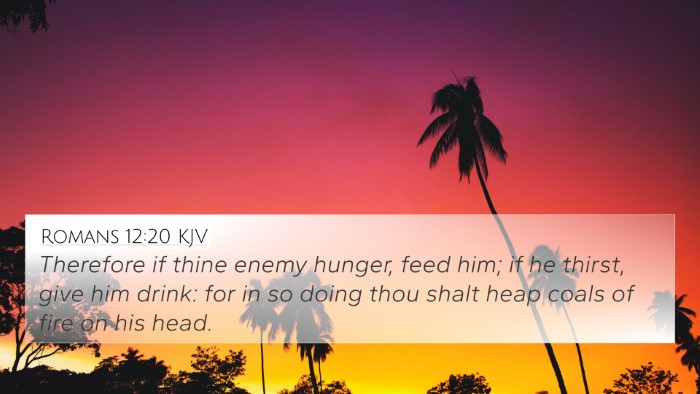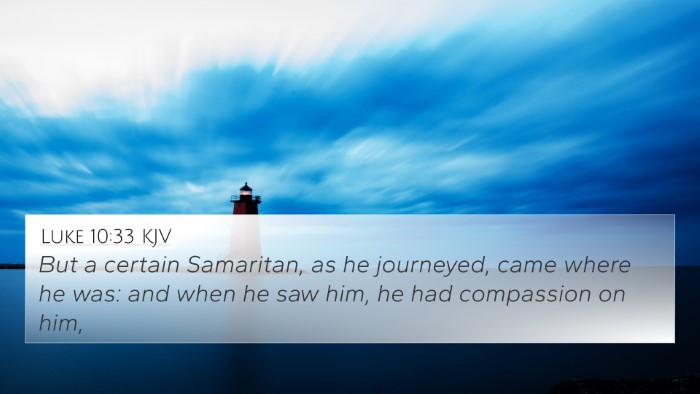Understanding Proverbs 25:21
Bible Verse: “If your enemy is hungry, give him bread to eat; and if he is thirsty, give him water to drink.” (Proverbs 25:21 KJV)
Meaning and Interpretation
Proverbs 25:21 offers profound insight into the nature of kindness, mercy, and the hard work of reconciliation in the face of animosity. The verse suggests that even in the context of conflict or rivalry, one should act with generosity and compassion towards those who are considered enemies. This principle is deeply rooted in the teachings of love and moral integrity found throughout Scripture.
Insights from Public Domain Commentaries
Matthew Henry: In his commentary, Matthew Henry elaborates on the significance of showing kindness to one's enemies. He posits that acts of kindness can serve to soften the hearts of adversaries and may even lead to their repentance. He emphasizes that Christians are called to reflect the love of God, regardless of personal feelings toward others.
Albert Barnes: Barnes discusses the practicality of this proverb. He notes that giving to one's enemy during their times of need not only exhibits Christian love but is also a strategy for overcoming enmity. It illustrates the power of acts of kindness as a transformative force in relationships, potentially changing the dynamics of hostility into friendship.
Adam Clarke: Clarke focuses on the moral teachings embedded in this verse. He explains that this kind of generosity goes beyond mere duty; it exemplifies a higher moral calling. He reflects on how acts of compassion are not just beneficial for the recipient but also serve to strengthen the character of the giver.
Cross References
This verse can be linked to several other passages in the Bible that reinforce the themes of love for enemies and acts of kindness:
- Matthew 5:44: “But I say to you, Love your enemies and pray for those who persecute you.”
- Luke 6:35: “But love your enemies, do good to them, and lend to them without expecting to get anything back.”
- Romans 12:20: “If your enemy is hungry, feed him; if he is thirsty, give him something to drink.”
- 1 Peter 3:9: “Do not repay evil for evil or insult for insult. On the contrary, repay evil with blessing.”
- Proverbs 24:17: “Do not rejoice when your enemy falls, and do not let your heart be glad when he stumbles.”
- Matthew 25:40: “And the King will answer them, ‘Truly, I say to you, as you did it to one of the least of these my brothers, you did it to me.’”
- Galatians 6:10: “So then, as we have opportunity, let us do good to everyone, and especially to those who are of the household of faith.”
Thematic Bible Verse Connections
This verse fits into a broader theme within Scripture concerning love and mercy. The narrative of Scripture promotes understanding and forgiveness, urging believers to respond to animosity with agape love.
Application for Today
In today's context, Proverbs 25:21 calls individuals to practice empathy and generosity, particularly towards those who may not treat them with kindness. By reflecting the love of Christ in our actions, we become agents of peace and reconciliation in a fractured world.
Bible Study Tools and References
For those interested in deeper exploration of scriptural connections, consider using the following:
- Bible Concordance: A comprehensive resource for finding scripture references based on keywords and themes.
- Bible Cross-Reference Guide: Guides designed to help locate related verses that address similar themes or concepts.
- Tools for Bible Cross-Referencing: Resources that streamline the process of identifying connections among Scripture.
Conclusion
Proverbs 25:21 serves as a powerful reminder of the necessity to act with love, even towards those we may consider adversaries. By drawing upon the wisdom of biblical texts and their interconnections, believers can cultivate a heart of compassion that transcends earthly conflicts.









